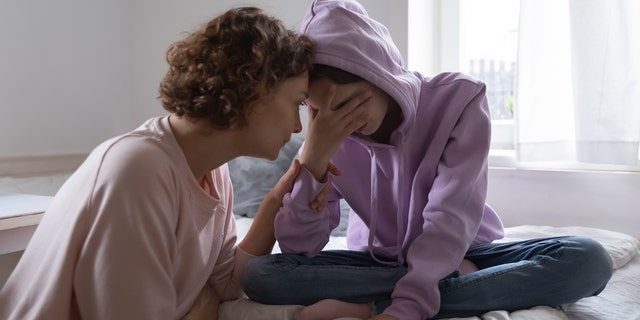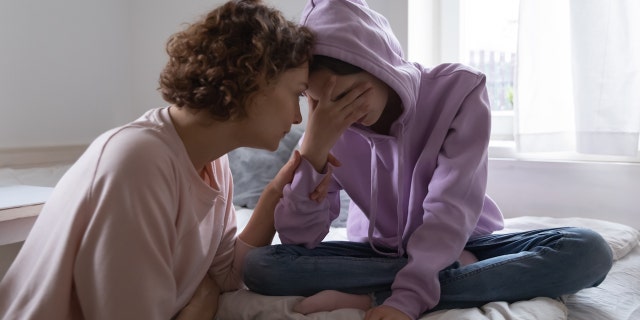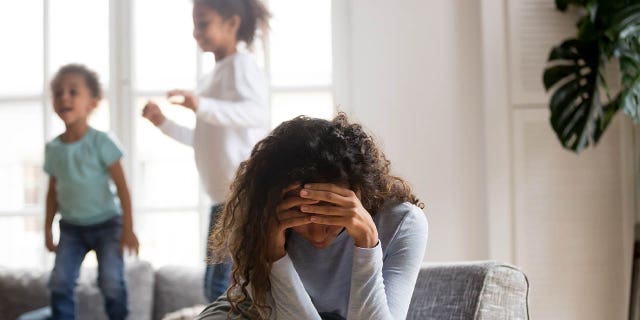
It’s well-known that COVID-19 protocols caused financial hardship — particularly among lower- and middle-class families — and now a new study highlights the toll those struggles took on children’s mental health.
A new study led by researchers from Columbia University and Weill Cornell Medicine, both in New York, suggests that family economic hardship was the biggest driver of “stress, sadness and COVID-related worry” among kids.
The study, published in the JAMA Network, also suggested that COVID-related school closures did not have an impact on kids’ mental health.
AS EMERGENCY ROOMS SEE MORE OF AMERICA’S MENTALLY ILL KIDS, NEW STUDY PINPOINTS ISSUES
Researchers analyzed data from the Adolescent Brain Cognitive Development Study, which was funded by the National Institutes of Health. That study surveyed 6,030 children between 10 and 13 years old in 21 U.S. cities between 2020 and 2021.
It also gathered data from kids and their guardians about their experiences during the pandemic, including job loss, remote schooling and COVID-related policies.
Additionally, it included questions about the link between sleep and mental health.

A new study suggests that family economic hardship was the biggest driver of “stress, sadness and COVID-19-related worry” among kids during the lockdowns. (iStock)
Dr. Michael Roeske, a licensed clinical psychologist and senior director of the Newport Healthcare Center, which is headquartered in California, was not involved in the study but said he was not surprised that financial struggles impacted kids’ mental health.
COVID-19 SHOCKER: PARENTS LIED ABOUT THEIR KIDS’ SICKNESS STATUS AND BROKE QUARANTINE RULES, STUDY FINDS
“Kids are often highly attuned to stress in the home,” he told Fox News Digital in an email.
“If there were feelings of uncertainty and concern, which almost certainly comes from loss of a job or reductions in income, it would undoubtedly impact them. If the parents are overly stressed or scared themselves, kids may no longer feel safe in the home. This can be devastating developmentally.”
“If parents are overly stressed or scared themselves, kids may no longer feel safe in the home.”
And in even more dire cases, kids may become worried about basic necessities and housing, he added.
Dr. Roeske said he is seeing the effects of the pandemic firsthand via Newport Healthcare, which operates a series of mental health treatment centers across the country.
“We’re counseling more kids struggling with depression, anxiety and suicidality than we saw previously,” he said.
Study suggests school closures had no mental health impact
While other studies have found that school closures did indeed cause a spike in children’s mental health struggles, this research did not identify any such link.
PARENTS, STUDENTS ON THE IMPACT OF SCHOOL CLOSURES THREE YEARS LATER
Dr. Yunyu Xiao, an assistant professor at Weill Cornell Medicine who co-authored the study, offered one possible explanation for what may seem like a surprising lack of impact.
“If children had more protective factors like increased parental care at home during lockdown, that would help with mental health,” she said in an email to Fox News Digital.

“Kids are often highly attuned to stress in the home,” one psychiatrist told Fox News Digital. “If there were feelings of uncertainty and concern, which almost certainly comes from loss of a job or reductions in income, it would undoubtedly impact them.” (iStock)
The study didn’t use specific measures of mental health, so it couldn’t speak to severity or whether new disorders emerged, said Dr. Roeske.
“Certainly, it is hard to argue that no association between school closures and children’s mental health existed given the isolation, uncertainty and even added time on devices that occurred as a result,” he said.
MAJORITY OF COLLEGE STUDENTS SUFFERING FROM MENTAL ILLNESS, ANXIETY AND DEPRESSION ON THE RISE: STUDY
“The disruption of one’s normal routine in such an extreme way alone can cause anxiety and symptoms of depression.”
Communication, mental health care are key
To protect kids’ mental health during times of hardship, it’s essential to maintain age-appropriate lines of communication, said Roeske, and to carefully consider how much children hear and know about any financial struggles.
KIDS’ SCREEN TIME SKYROCKETED DURING PANDEMIC — AND IT’S STILL HIGHER THAN PRE-COVID
“Know the signs of distress, like changes in behaviors, eating patterns and sleep,” he said.
“And get your child help if things do not improve or continue to worsen; do not wait for things to get really bad.”

It’s important for parents to recognize signs of distress and to know how to get help for their kids. (iStock)
Dr. Roeske pointed out that many parents don’t know where to turn for help.
He cited a recent survey of 1,000 parents of teens ages 13-17 conducted by Wakefield Research for Newport Healthcare.
The researchers didn’t look at the severity or onset of new psychiatric disorders.
While nearly half of parents (46%) reported that the pandemic allowed them to see more of their teens’ mental health struggles during quarantine and remote learning, nearly 70% lacked the knowledge of what to do if their teen were experiencing problems that might require treatment.
Study had limitations
Because the data was self-reported, Dr. Xiao said there is a chance that responses were biased or inaccurate. Also, the researchers didn’t look at the severity or onset of new psychiatric disorders.
“Future research should incorporate more precise mental health measurements, such as clinical scales, and make use of advanced techniques for more efficient and bias-corrected estimations,” she said.
CLICK HERE TO SIGN UP FOR OUR HEALTH NEWSLETTER
There may also be other disruptive factors, such as COVID-19-related deaths in the family, which could affect mental health, Dr. Xiao also said.
“While our study aimed to correct bias for family financial and school disruptions, it does not imply that no other significant disruptions are present,” she explained.
CLICK HERE TO GET THE FOX NEWS APP
The study also did not have a large enough sample to segment by race, age, gender or family environment.

 Latest Breaking News Online News Portal
Latest Breaking News Online News Portal




